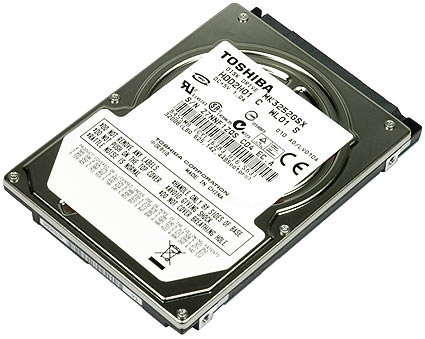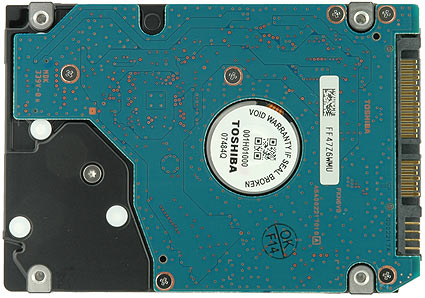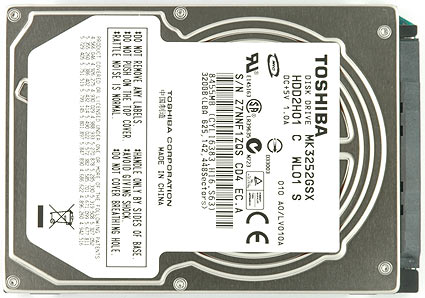WD and Toshiba Join the 320 GB 2.5" HDD Club
Toshiba MK3252GSX (320 GB)
As I mentioned in the introduction, Toshiba's latest addition to the 2.5" hard drive family is very capable of competing against Samsung and Western Digital. This hasn't always been the case in recent years, as Toshiba typically was close behind the other players, but failed to make it to the very top. Although Toshiba doesn't win the crown in this shootout, its MK3252GSX provides very solid performance at up to 65 MB/s. The application benchmark results prove that the new drive is a good choice as a system drive, with results being in the upper areas of our charts. Access time and I/O benchmark results are only average, though.
Toshiba has two models that sound almost similar: the MK3252GSX, as reviewed in this article, and the MK3253GSX. The latter shows exactly the same technical specifications, but these drives are equipped with a free-fall sensor. This sensor automatically moves the read/write heads into a secure parking position if it detects a certain level of acceleration, which indicates that the drive could be falling or experiencing some other sort of physical impact. While many business notebooks come with a free-fall sensor (Lenovo's T60 series is an example), integrating it right into the drive is the second possible approach, which certainly doesn't hurt.
The minimum power requirement of 1.0 W in idle indicates that the drive must be using the fast SATA/300 interface. Many other 5,400 RPM hard drives, which are based on SATA/150 specifications, stay well below this power requirement, reaching as little as 0.7 W. The maximum power requirement under load (measured with IOmeter) of 3.5 W isn't revolutionary, either. Only few 5,400 RPM drives require more maximum power (e.g. Seagate's Momentus 5400.4), but many stay within 2.5 and 3.0 W. There even is a 7,200 RPM hard drive: Hitachi's Travelstar 7K200, which only requires 1.1-3.2 W power. A SATA/150 interface would hardly have any impact on the solid benchmark results, but it can help to reduce unnecessary power consumption, which is especially important in notebooks with purported long battery lives.
Toshiba doesn't only offer the 320 GB top model, but there are smaller capacity versions that offer similar performance levels, including capacities of 80, 120, 160 and 250 GB. All of them are covered by a three-year factory warranty.
Get Tom's Hardware's best news and in-depth reviews, straight to your inbox.
Current page: Toshiba MK3252GSX (320 GB)
Prev Page More High Capacity HDDs For Notebooks Next Page Western Digital Scorpio WD3200BEVT (320 GB)
Patrick Schmid was the editor-in-chief for Tom's Hardware from 2005 to 2006. He wrote numerous articles on a wide range of hardware topics, including storage, CPUs, and system builds.


